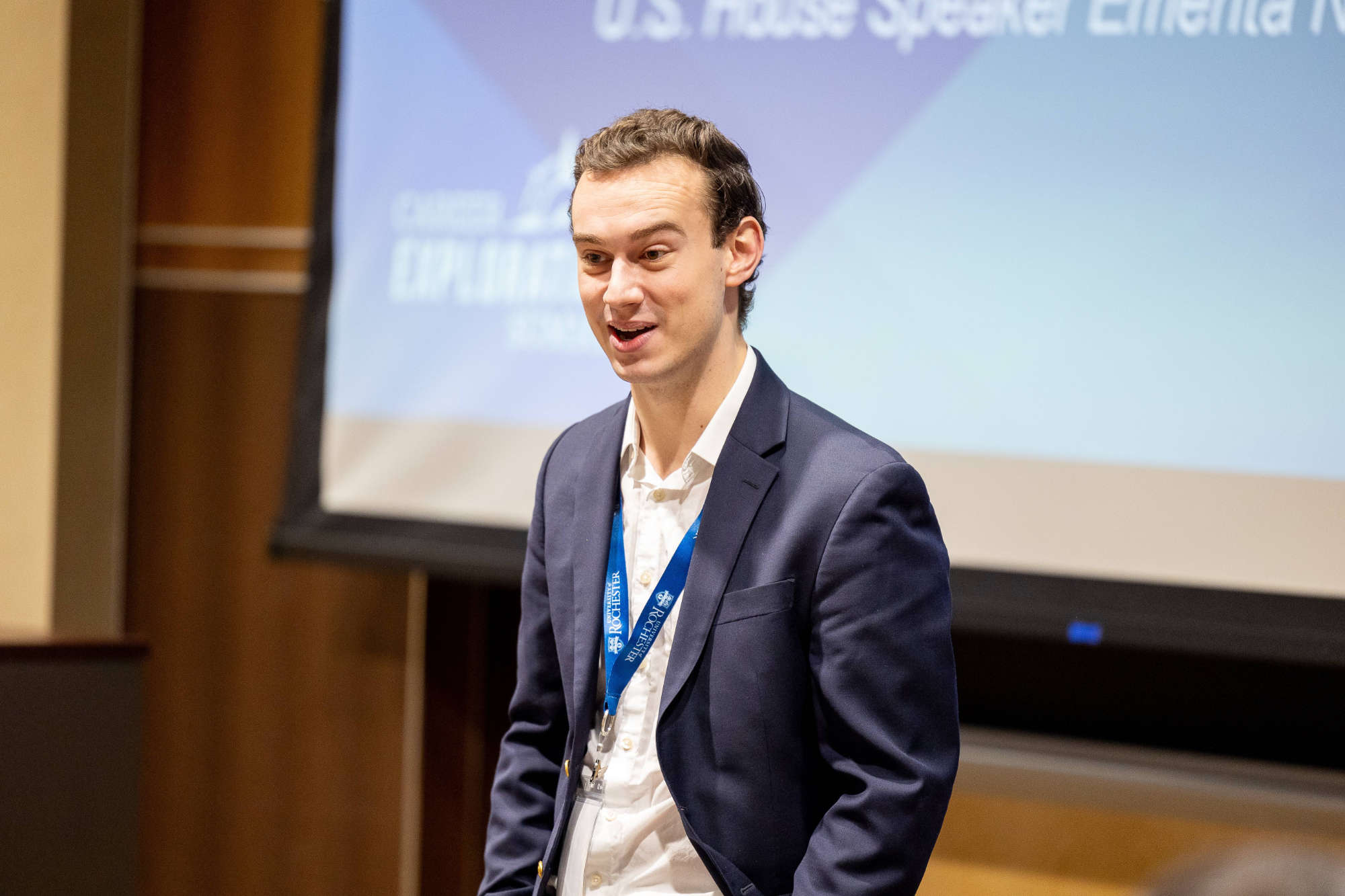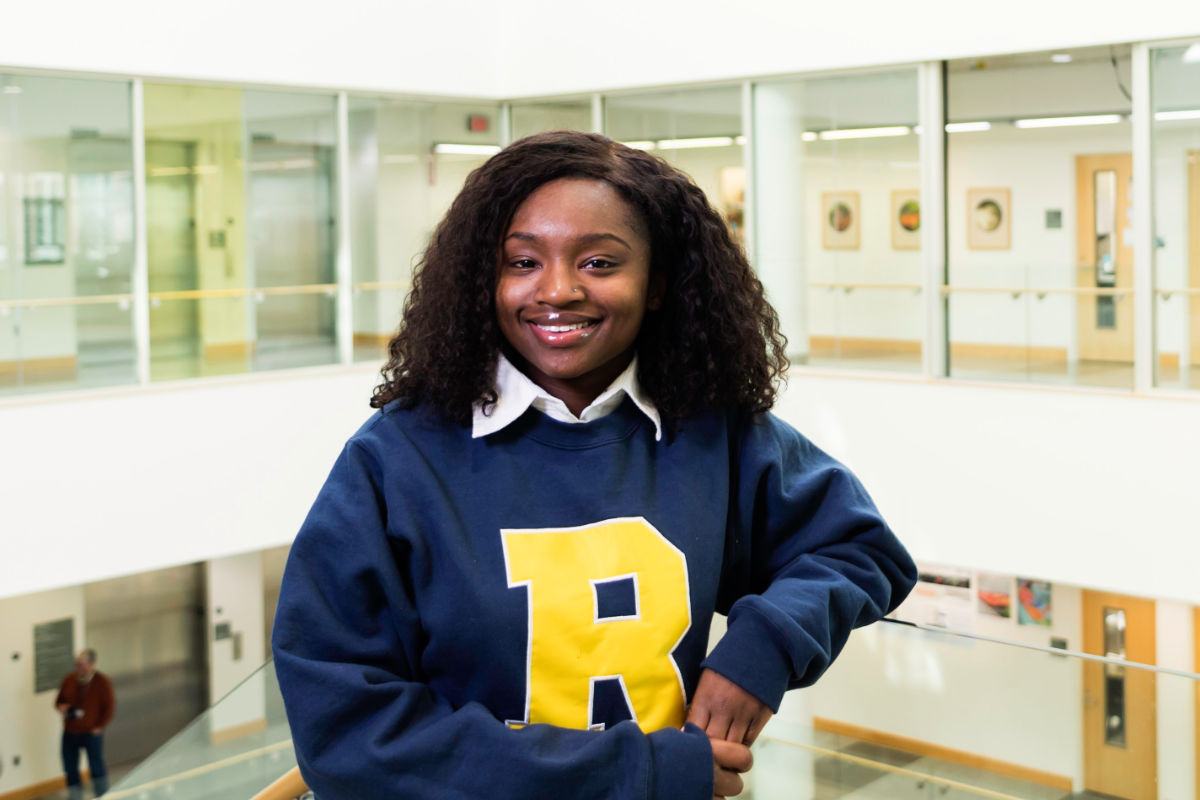Krager shares takeaways for students and graduates who want to land a dream job after college.
As communications director for House Speaker Emerita Nancy Pelosi, Ian Krager ’22 interacts with the national media on a regular basis.
“My job is to be the spokesperson for an incredibly high-profile Member of Congress,” he says. “If any reporter wants to talk to Nancy Pelosi, they go through me.” He also pens all of Pelosi’s speeches and social media posts.
Krager, who grew up near Canandaigua, New York, and majored in political science, credits the University of Rochester with paving the way for his professional advancement. “I wouldn’t be where I am today if not for Rochester,” he says.
He shares these takeaways from his University experience to guide fellow Rochester students and graduates who are eager to forge successful careers after college.
Take advantage of Rochester’s flexible curriculum to explore opportunities.
Krager says one of the main attractions of Rochester was its signature flexible curriculum, which allowed him to study subjects that were appealing without getting bogged down by core requirements.
“It allowed me to take stock of what I was interested in beyond academics,” he says. “I was really involved on campus in things like Student Government, the Committee for Political Engagement, and also did a lot of work with the Admissions office. And in those roles, I built a lot of soft skills that were really applicable to the job that I have now —public speaking and collaborative skills, and even negotiation tactics in student government. Looking back, I don’t know how I would be successful now if not for those involvements.”
Keep your options open—even if that means zigzagging into a new career.
“My biggest advice is to not silo yourself into a career that you think you want without trying other things,” Krager says. “Be open to other things.”
He was a sophomore at Rochester when the COVID-19 pandemic hit in March 2020. “I had internships lined up, and everything just went away,” he says. “So, I reached out to several congressional offices. I said, ‘Hey, I’m around, and I’m not doing anything other than being a student online. I’d love to do anything for you that I can.’”

Krager ended up working as a press intern for US Senator Kirsten Gillibrand (D-NY) for six months. That experience opened the door to his first job with Pelosi. “It introduced me to the world of political communications in a way I hadn’t understood before because it was the first time I got to contribute to what goes on behind-the-scenes in an elected official’s press operation,” he says.
“You always think your career will be a linear path. Sometimes, the best opportunities come from a path you thought would be a step backward.”
Connecting with fellow alumni can mean tapping into their networks, too.
Krager recommends that students find common ground when reaching out to alumni to build their network.
“It’s harder to connect with people you have little in common with,” he says. “It’s much easier to say ‘You went to Rochester, I go to Rochester,’ and go from there.”
But, he advises, don’t just talk about the jobs they have. “Look at all the jobs they had before. They’ve met people in those jobs that they probably keep in touch with, and that could help you build your network.”
One University resource is The Meliora Collective, an online platform that allows members of the University of Rochester community—including alumni—to bond and explore opportunities for personal and professional development.
When it comes to networking, remember: Interested is interesting.
Krager adds that the best way to form a connection with someone is to be genuinely interested in the other person’s life, choices, perspectives, and career paths.
“The number one rule about networking is that everybody loves talking about themselves,” he says. “If you sit down with someone and say, ‘I would love for you to talk to me about your life and what you did to get to where you are now,’ they’re going to enjoy that. And then you ask them, ‘Do you have any advice for me at this stage in my career? I’m really hoping to get to where you are today.’”
Go beyond the job boards during your job hunt.
Students may think the only jobs available are ones that are posted. But Krager says that’s not always true.
“A lot of jobs aren’t advertised,” he says. “My current job was not advertised. It’s all about the network, because once people have you in mind for certain positions, they will keep you in mind for openings that aren’t necessarily ones that are going to be advertised.”
When you do apply for a specific opening, Krager says to pay attention to the job description. “What they’re saying in the job description is what they want you to say in the interview,” he says. “If they say they want a team player, give examples of when you worked within a team. If they want someone who works in high-intensity environments, talk about experiences you’ve had like that.”
Kindness goes a long way—in the professional world and beyond.
Being courteous to all could lead to good things down the road, according to Krager.
“Be kind, because you never know how anyone’s careers might progress,” he says. “The office intern you meet today could be the person who interviews you for your dream job in five years. Making every effort to bring kindness and respect to any professional relationship leaves a lasting impression on those you meet and will never be a bad approach.”





